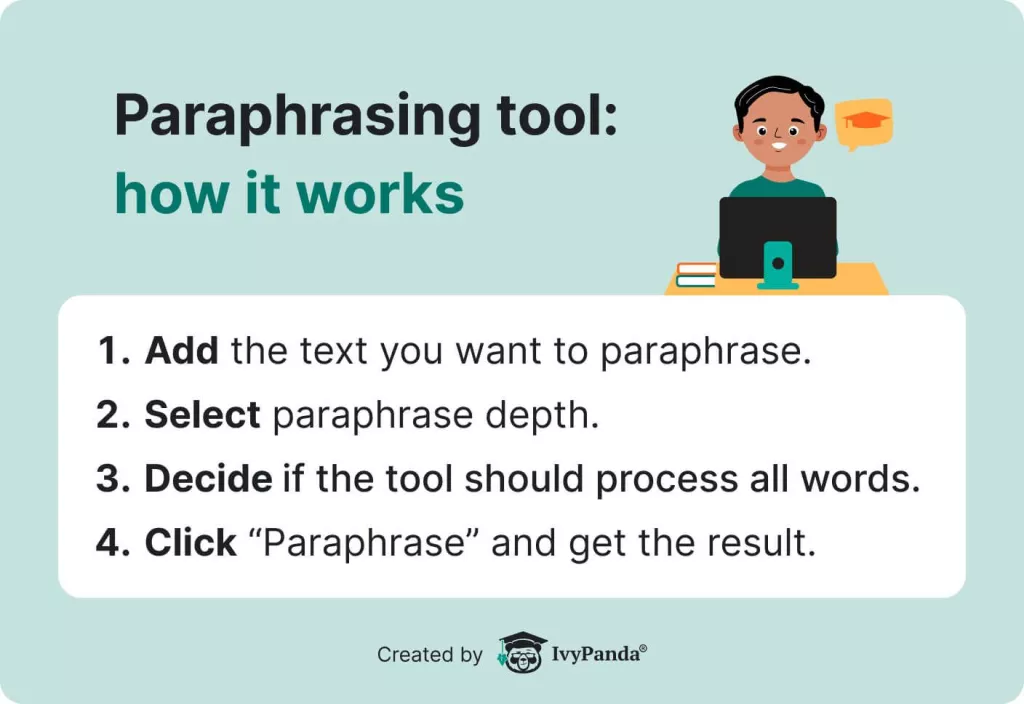Paraphrasing Tool: Online & Free
The Paraphrasing Tool helps you transform and improve your text quickly. Perfect for refining any writing, it ensures clarity, originality, and better readability with ease.
Easily change the wording of your text with IvaPanda’s paraphrasing tool. The free online instrument automatically picks the best synonyms, giving you the option to customize the result. Simply select the percentage of words you want to change and click the button!
🤔 Paraphrasing Tool: Who Is It for?
Paraphrasing is essential in various fields.

IvyPanda’s paraphraser can benefit a wide range of users:
- Students can easily change the wording of their essays and research papers, ensuring the text remains consistent, varied, and engaging. A paraphrasing tool also helps avoid plagiarism and uphold academic integrity.
- Researchers rely on paraphrasers when working on literature reviews. Such tools allow them to integrate ideas from multiple sources while maintaining originality and clarity.
- Writers use paraphrasing tools to refine and bring diversity to their texts, find effective ways to express ideas, and make their content more engaging.
- Business professionals can rework documents, reports, notes, and emails, adapting their messages to different contexts and audiences. IvyPanda’s paraphrasing tool can help enhance readability and flow of such documents while saving time.
🔢 Paraphrasing Tool: How It Works
Take the following steps to get a paraphrased piece:
- Add the text you want to paraphrase into the left textbox. The paraphraser accepts up to 5,500 characters.
- Select paraphrase depth. Decide how many words should be replaced with synonyms.
- Indicate whether the tool should process all words or skip those starting with capital letters.
- Click “Paraphrase” and get the result.
🏆 Choosing the Best Paraphrasing Tool
Here’s how to select the best paraphrasing tool based on your specific requirements:
- Identify your needs. Determine whether you’ll be using the paraphrasing tool for academic writing, professional tasks, or creative projects. When choosing tools, give preference to those whose functions align with the intended purpose, such as sentence restructuring, tone adjustment, or handling specific word count limits.
- Set your budget. Decide whether you’re looking for a free tool or are willing to pay for advanced features. Many paid tools offer trials, so you can test them before committing.
- Explore the offers. Look for the tools that match your criteria. Narrow your list to 2-3 suitable options. You can also check user reviews and descriptions to assess their functionalities.
- Check accuracy. Evaluate the quality of output by paraphrasing sample texts. This will help you find the tool that delivers the most natural, context-appropriate result aligning with your intended purpose.
- Consider additional features. Look beyond paraphrasing quality. Features like word limits, supported formats, processing speed, and customer support can significantly impact your user experience.
Follow these steps to find the best paraphrasing tool that meets all your requirements.
❓ Paraphrasing Tool FAQ
📌 What does paraphrase mean?
Paraphrasing means reformulating a text in your own words while keeping its original message. It’s often used to clarify ideas, adapt content for different audiences, or avoid plagiarism.
📌 Why is paraphrasing important in academic writing?
Paraphrasing enables academic writers to integrate ideas from various sources into a unified narrative. However, it is essential to properly cite the original in order to maintain academic integrity and give credit to the original authors.
📌 How to paraphrase into simple words?
- Start by thoroughly reading the text to understand its core arguments and ideas.
- Rewrite the key points in simpler language, avoiding scholarly jargon and overly complex grammatical structures.
- Review the simplified version to ensure the original meaning is accurately preserved.
📌 Which is the best paraphrasing tool online and free?
IvyPanda’s Paraphrasing Tool stands out for its speed, adaptability, and ease of use. It delivers high-quality results without requiring registration, making it a top choice for free paraphrasing.